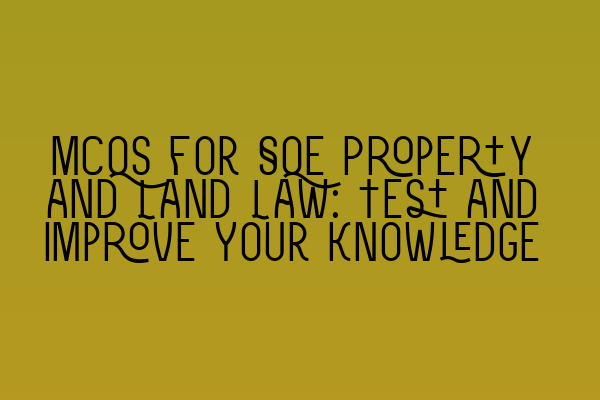MCQs for SQE Property and Land Law: Test and Improve Your Knowledge
Welcome to SQE Property Law & Land Law! As a solicitor, writer, and SEO expert, I’m here to help you navigate the complex world of property and land law. In this blog post, we will focus on MCQs (Multiple Choice Questions) to test your knowledge and reinforce your understanding of key concepts. Whether you are preparing for the SQE exams or looking to enhance your understanding of property law, these MCQs will be a valuable resource.
Before we dive into the MCQs, it’s important to mention that SQE Property and Land Law is a vast and nuanced subject. It covers various topics such as ownership, conveyancing, leases, easements, mortgages, and more. To truly master this subject, it is essential to have a solid foundation and a comprehensive understanding of the intricacies involved. Our MCQs will help you evaluate your understanding of these topics and identify areas for improvement.
Let’s get started with the MCQs:
1. Which of the following is NOT a recognized form of ownership in property law?
a) Fee simple absolute
b) Joint tenancy
c) Tenancy in common
d) Squatter’s rights
(Answer: d) Squatter’s rights. Squatter’s rights refer to the legal principle of adverse possession, which allows someone who has occupied another person’s property for a certain period to potentially acquire legal title to that property. While it is an important concept, it is not a recognized form of ownership.)
2. True or False: A lease grants the tenant ownership of the property.
a) True
b) False
(Answer: b) False. A lease grants the tenant the right to occupy and use the property for a specified period, but ownership remains with the landlord.)
3. Which of the following is a restrictive covenant?
a) A clause in a lease that prohibits pets on the property
b) A clause in a lease that allows the tenant to sublet the property
c) A provision in a deed that restricts the use of the property to residential purposes only
d) A provision in a mortgage agreement allowing the lender to foreclose in case of default
(Answer: c) A provision in a deed that restricts the use of the property to residential purposes only. A restrictive covenant is a legal obligation that limits the use, development, or modification of a property. They are often found in deeds and are enforceable against subsequent owners.)
4. What is adverse possession?
a) The act of legally acquiring property through a will
b) The act of occupying another person’s property without permission
c) The act of transferring ownership of property through a lease
d) The act of resolving a dispute through alternative dispute resolution methods
(Answer: b) The act of occupying another person’s property without permission. Adverse possession is a legal principle that allows someone who has occupied another person’s property for a certain period to potentially acquire legal title to that property.)
5. True or False: Easements are a form of ownership in property law.
a) True
b) False
(Answer: b) False. Easements are not a form of ownership; they are rights or privileges granted to individuals or entities to use another person’s property for specific purposes, such as access or utilities.)
I hope these MCQs have challenged and expanded your knowledge of property and land law. If you found them helpful, be sure to check out our related articles for further study:
– [SQE 1 Practice Exam Questions](https://fqps.co.uk/sqe/sqe1-preparation/mcq-practice-quiz): Explore our practice exam questions to build your confidence and test your knowledge for the SQE 1 exams.
– [SQE 1 Practice Mocks FLK1 FLK2](https://fqps.co.uk/sqe/sqe1-preparation/practice-mocks-quiz): Take advantage of our practice mocks for the SQE 1 exams, specifically focusing on FLK1 and FLK2, to further refine and strengthen your understanding.
– [SQE 2 Preparation Courses](https://fqps.co.uk/sqe/sqe2-preparation): Discover our comprehensive preparation courses specifically tailored for the SQE 2 exams, providing you with the necessary tools and resources to excel.
– [SQE 1 Preparation Courses](https://fqps.co.uk/sqe/sqe1-preparation): Enhance your preparation for the SQE 1 exams with our specialized courses designed to cover all the essential topics and give you a competitive edge.
– [SRA SQE Exam Dates](https://fqps.co.uk/sqe/sqe1-sqe2-exam-dates): Stay updated with the latest SRA SQE exam dates to ensure you have ample time to prepare and plan your studies effectively.
By consistently testing your knowledge and utilizing these valuable resources, you will be well-prepared to tackle the SQE Property and Land Law examinations.
Remember, property and land law is a dynamic and ever-evolving field. It requires a deep understanding of legal precedents, statutes, and the ability to analyze complex scenarios. Keep studying, practicing, and seeking guidance from experienced professionals to strengthen your expertise in this area.
If you have any questions or need further assistance, do not hesitate to reach out to us at SQE Property Law & Land Law. Our team of experts is here to support you on your journey to becoming a successful solicitor. Happy studying!
Note: This blog post does not serve as legal advice. Please consult a qualified professional for any legal matters or specific questions you may have.
